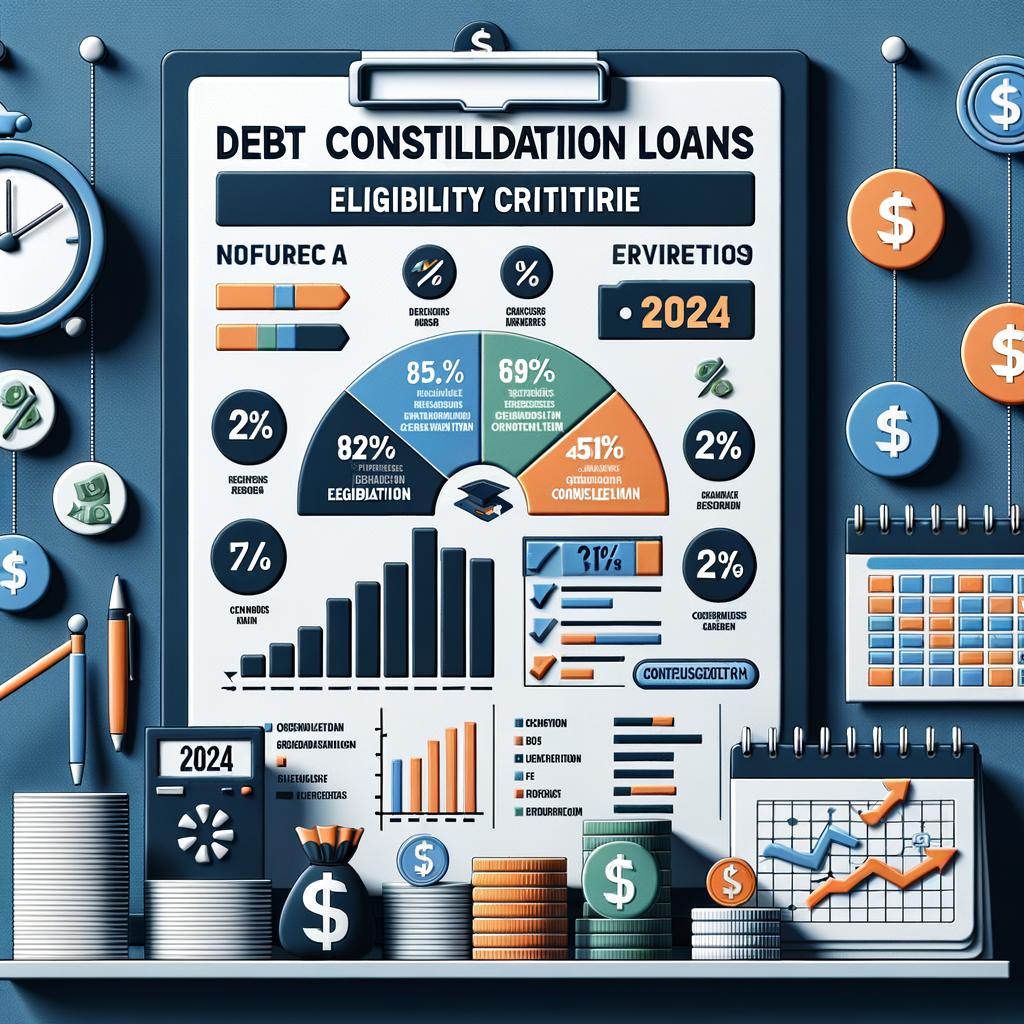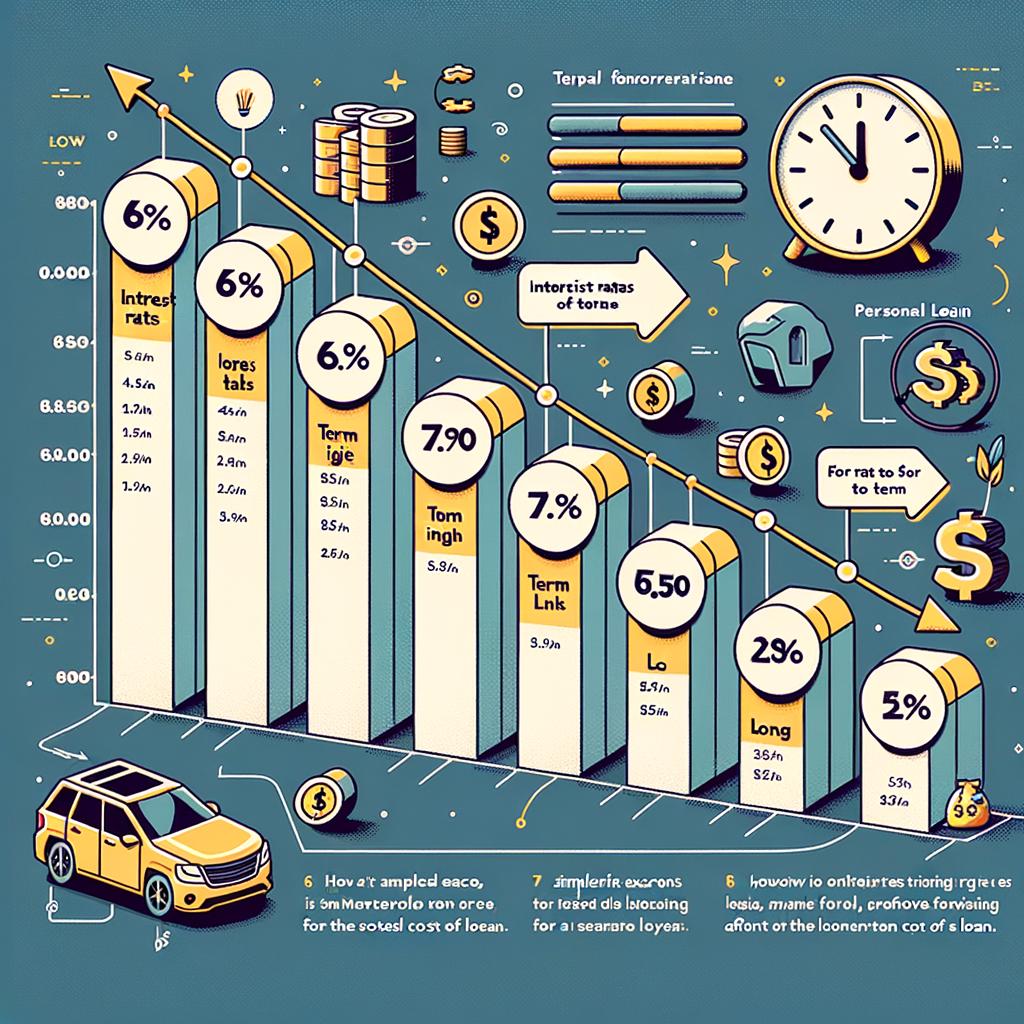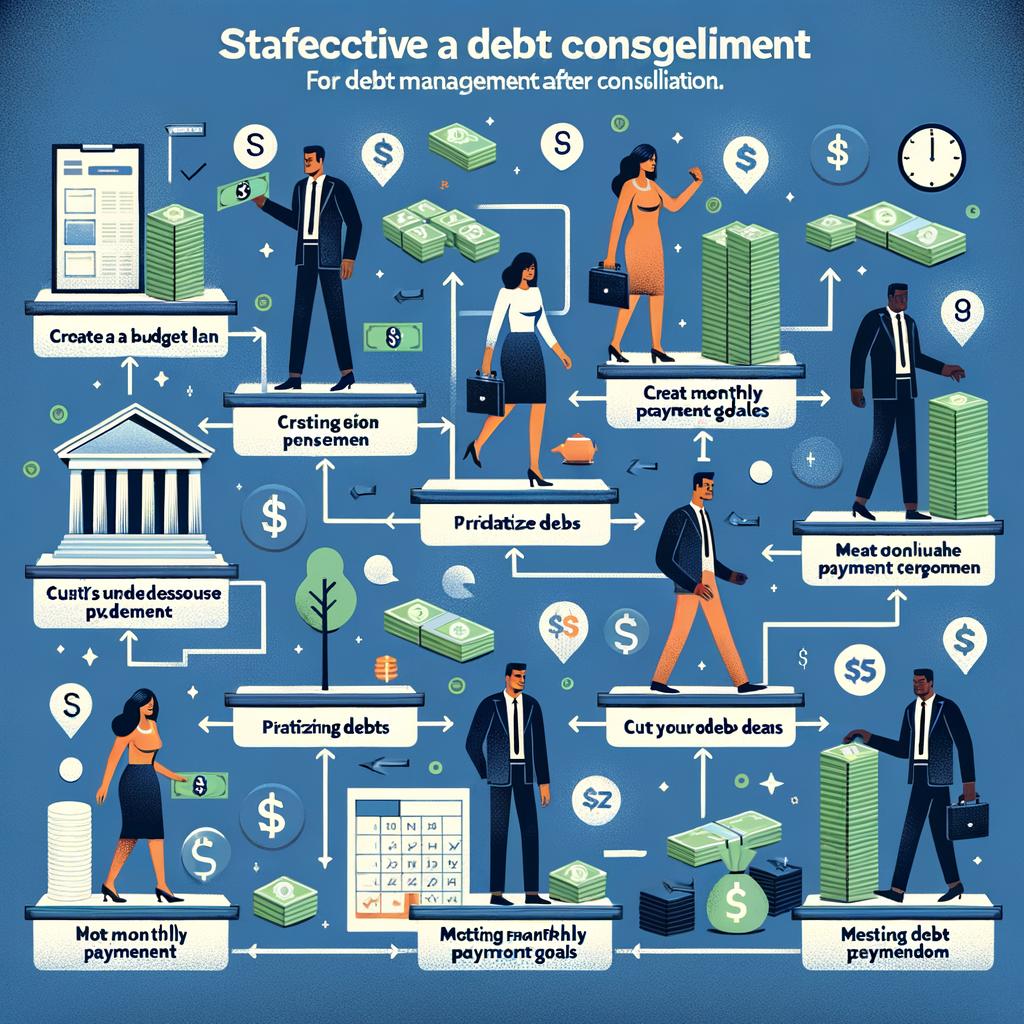In the ever-shifting landscape of personal finance, 2024 presents both challenges and opportunities for individuals grappling with multiple debts. As the weight of credit card balances, student loans, and other liabilities push people towards seeking respite, debt consolidation emerges as a beacon of hope. Imagine converting a chaotic array of monthly bills into a single, manageable payment, potentially with a lower interest rate. This vision is the promise of a debt consolidation loan. But as appealing as this solution sounds, finding the best personal loan for debt consolidation requires a keen eye, strategic thinking, and up-to-date knowledge. In this article, we navigate the intricacies of debt consolidation loans in 2024, offering insights and guidance to help you make an informed decision on your journey to financial freedom.
Table of Contents
- Determining Eligibility for Debt Consolidation Loans in 2024
- Comparing Interest Rates and Terms of Top Personal Loans
- Strategies for Effective Debt Management Post-Consolidation
- Expert Tips for Choosing the Best Loan Provider
- Wrapping Up

Determining Eligibility for Debt Consolidation Loans in 2024
When contemplating consolidating your debt in 2024, it’s crucial to determine if you qualify for a debt consolidation loan. Various factors will play a significant role in this decision, and understanding each can help you navigate the process more effectively. Here are some key points to consider:
1. Credit Score
Your credit score is one of the essential criteria lenders assess. A higher score typically correlates with lower interest rates and better loan terms. However, even if you have a less-than-perfect credit score, don’t be discouraged. There are specialized loans tailored for different credit ranges.
2. Debt-To-Income Ratio (DTI)
Your DTI ratio, which is the percentage of your monthly income that goes towards paying off debt, is another critical factor. Lenders prefer borrowers with a lower DTI ratio as it indicates better financial stability. Generally, a DTI below 40% is favorable.
3. Employment Status
Lenders look for steady employment and consistent income. Full-time employment is ideal, but some lenders may also consider part-time or freelance work, provided there is proof of stable income.
4. Existing Debts
The amount and type of current debts you have will influence the loan approval decision. Lenders often prefer consolidating unsecured debt like credit card balances over secured debt such as mortgages.
5. Loan Amount and Terms
The desired loan amount and repayment period will affect your eligibility. Make sure to choose an amount and terms that align with your repayment capabilities.
6. Financial History
A clean financial history without recent bankruptcies or defaults is always advantageous. Lenders may be wary of applicants with a troubled financial past.
- Check your credit report regularly
- Calculate your DTI before applying
- Gather proof of steady income
- Assess the types of debts for consolidation
- Choose a reasonable loan amount and terms
Eligibility Criteria Summary
| Criteria | Details |
|---|---|
| Credit Score | 600+ recommended |
| DTI Ratio | Below 40% |
| Employment | Stable income source |
| Existing Debts | Unsecured preferred |
| Financial History | No recent bankruptcies |
By preparing adequately and understanding these criteria, you can increase your chances of securing a debt consolidation loan in 2024. Carefully consider these factors to find the best personal loan that meets your needs.

Comparing Interest Rates and Terms of Top Personal Loans
When it comes to debt consolidation loans, understanding the interest rates and terms offered by various lenders is crucial. In 2024, competitive personal loans with varying characteristics are available, and selecting the right one can significantly impact your financial well-being.
Interest rates are typically the most scrutinized aspect when comparing personal loans. While most lenders offer fixed rates, the actual percentage can vary based on your credit score, loan amount, and repayment term. Here are some general ranges to expect in 2024:
- Excellent Credit (720-850): 5.99% – 10.99%
- Good Credit (690-719): 11.00% – 15.99%
- Fair Credit (630-689): 16.00% - 23.99%
- Poor Credit (300-629): 24.00% – 35.99%
Terms or the length of the loan can vary significantly among lenders. Longer terms usually mean smaller monthly payments but more interest paid over time. Common loan terms available are:
- 36 months
- 48 months
- 60 months
- 72 months
Consider the following when examining loan terms:
- Shorter terms: Higher monthly payments, less interest overall.
- Longer terms: Lower monthly payments, more interest overall.
Here’s a table featuring interest rates and terms from top lenders for 2024:
| Lender | Interest Rates | Loan Terms | Max Loan Amount |
|---|---|---|---|
| Lender A | 5.99% – 24.99% | 36 to 60 months | $50,000 |
| Lender B | 6.49% - 26.99% | 24 to 72 months | $35,000 |
| Lender C | 6.99% – 28.99% | 36 to 60 months | $40,000 |
Paying attention to prepayment penalties is also crucial. Some lenders charge a fee if you pay off your loan early to recoup some of the lost interest. Others, however, encourage early payoff without penalties.
Moreover, origination fees can vary. A one-time fee deducted from your loan amount before funds are disbursed, it typically ranges from 1% to 8% of the loan amount. Some top lenders waive these fees altogether.
Comparing the total cost of the loan, not just the monthly payment or interest rate, can help you make an informed decision. Consider the comprehensive cost over the life of the loan, including interest, fees, and potential penalties.
Ultimately, the best personal loan for debt consolidation in 2024 will depend on your unique financial situation. Carefully analyze these aspects to secure a loan that provides the best terms and rates available.

Strategies for Effective Debt Management Post-Consolidation
Consolidating debt can provide a fresh start, but maintaining control over finances post-consolidation is pivotal for long-term success. Here are several key strategies to ensure effective debt management after you consolidate your loans:
Adopt a Realistic Budget
Implementing a realistic budget is the foundation of prudent financial management. Outline all your sources of income and essential expenses. Consider the following critical components:
- Fixed Costs: Rent, utilities, insurance.
- Variable Costs: Groceries, dining out, entertainment.
- Savings and Emergency Fund: Prioritize even a small amount each month.
| Category | Percentage of Income |
|---|---|
| Housing | 30% |
| Transportation | 15% |
| Savings | 20% |
| Debt Repayment | 15% |
| Miscellaneous | 20% |
Avoid Accumulating New Debt
It can be tempting to use credit cards or take out new loans post-consolidation, but it’s crucial to avoid this trap. Rely on a debit card or cash to manage daily expenses and steer clear of falling back into a cycle of indebtedness.
Monitor Your Credit Score Regularly
Regularly checking your credit score helps you stay informed about your financial health. Use free credit report services to review your report for inaccuracies and resolve any discrepancies promptly. A healthy credit score can also help you secure favorable interest rates in the future.
Set Financial Goals
Establish clear financial goals such as paying off a specific amount of debt within a certain timeframe or saving for a major expense. Breaking down larger goals into smaller, manageable milestones maintains motivation and provides a sense of achievement.
Automate Payments
Automate your payments to avoid late fees and ensure your debt is consistently being repaid. Automatic payments can help maintain good standing with your lender and contribute positively to your credit score.
Embrace Mindful Spending
Adopt mindful spending habits by distinguishing between wants and needs. Limit impulse purchases and focus on spending money on items and experiences that genuinely add value to your life.
Seek Financial Counseling if Needed
If you find managing your debt overwhelming, consider seeking help from a financial counselor. Professionals can provide tailored advice and practical strategies, helping you stay on track with your financial objectives.

Expert Tips for Choosing the Best Loan Provider
Choosing the right loan provider is a crucial step in achieving successful debt consolidation in 2024. There are several key factors potential borrowers should consider to ensure they get the best deal possible.
1. Check the Interest Rates
Interest rates are a major consideration when selecting a loan provider. Lower interest rates translate to lower monthly payments and less paid over the life of the loan. Look for providers offering competitive rates.
2. Understand the Fees Involved
Some loan providers charge additional fees, which can include origination fees, late payment fees, and prepayment penalties. Be sure to read the fine print to understand all potential charges. Here’s a comparison of common loan fees:
| Provider | Origination Fee | Late Payment Fee | Prepayment Penalty |
|---|---|---|---|
| Lender A | 1% | $25 | None |
| Lender B | 2% | $30 | None |
| Lender C | 1.5% | $20 | $50 |
3. Assess the Loan Terms
Look at the loan terms offered by different providers to determine which one aligns best with your financial goals. Consider the length of the repayment period, as it will impact your monthly payments and total interest paid.
- Short-term loans may have higher monthly payments but can save on interest.
- Long-term loans can lower monthly payments but usually result in paying more interest over time.
4. Evaluate Customer Service
A lender’s customer service can make a big difference in your overall experience. Choose a provider known for their responsive and helpful customer service, whether you prefer phone support, chat, or in-person meetings.
5. Read Reviews and Testimonials
Online reviews and testimonials can offer insights into other borrowers’ experiences. Look for patterns in the feedback to identify any red flags or particularly positive aspects of a lender.
6. Verify the Lender’s Credibility
Ensure your chosen provider is legitimate by checking their credentials and reputation. Verify if they are registered and follow standard financial regulations.
7. Compare and Contrast
Don’t settle for the first offer you receive. Compare multiple loan providers to find the best interest rates, terms, and fees. Creating a comparison table can help visualize the options:
| Provider | Interest Rate | Loan Term | Monthly Payment |
|---|---|---|---|
| Lender A | 5.5% | 3 years | $300 |
| Lender B | 6.0% | 4 years | $250 |
| Lender C | 5.75% | 5 years | $200 |
Wrapping Up
As we venture further into 2024, the path to financial clarity through debt consolidation loans becomes more navigable. By understanding the landscape, assessing your personal needs, and comparing the best offers available, you can transform your financial horizon from cloudy to clear. Remember, the journey to debt consolidation is not merely about merging what you owe; it’s about forging a future where you live free from financial stress, with control over your monetary destiny. Here’s to making informed, prudent choices that guide you toward a more prosperous and peaceful life. Happy consolidating!
